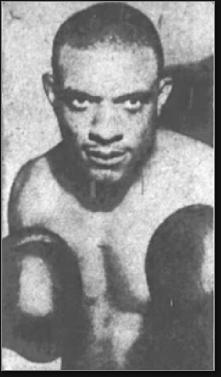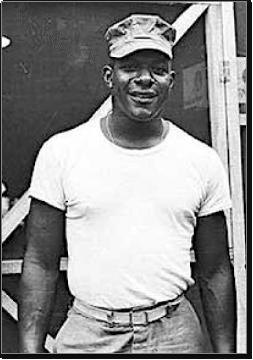|

Percy Price
Sport: Boxing
Born: May 19, 1936
Died: January 12, 1989
Town: Salem
Percy Price Jr. was born May 19, 1936 in Salem. At the age of 7, he was hospitalized with rheumatic fever for six months, and was unable to walk for another year. His mother forbid him to leave the house, but he snuck out and slowly but surely recovered. Finally, she told Percy, “If you keep on running, you’ll kill yourself.” He insisted he would be fine. “All right,” she told him, “It’s your life.” Percy grew tall and muscular.
The family moved to Philadelphia near the end of World War II and Percy later attended Overbrook High. He served as the backup center behind Wilt Chamberlain on the basketball team but didn’t see much action. Growing up, Percy always dreamed of becoming a Marine. In 1955, he enlisted and attained the rank of Staff Sergeant. The man known to one and all as Big Percy distinguished himself as a thoughtful, quiet, inspiring leader. Many of the soldiers who knew him described him as “larger than life.”
 Boxing was a huge deal in the military and when the Marine Corps coaches in Hawaii got a load of the 6’3” 210-pounds teenager, they pushed him right into the ring. The only problem was that Percy’s hands were so big that special gloves had to be made for him. He called his right hand The Soupbone. In 1959, Percy was transferred to the Quantico Marine Barracks, where he came under the tutelage of Frank Baracoa. Boxing was a huge deal in the military and when the Marine Corps coaches in Hawaii got a load of the 6’3” 210-pounds teenager, they pushed him right into the ring. The only problem was that Percy’s hands were so big that special gloves had to be made for him. He called his right hand The Soupbone. In 1959, Percy was transferred to the Quantico Marine Barracks, where he came under the tutelage of Frank Baracoa.
In 1960, Percy, attempted to make the US Olympic team as a heavyweight. To do so, he had to get past Archie Milton of San Jose State, the NCAA heavyweight champion in 1958 and 1959, and runner-up in 1960. Seconds into the fight, Milton knew he was facing a force of nature. Percy hit hard and punched equally well with his left or his right. He dominated the match, sending Milton crashing to the canvas.
Next, Percy had to deal with a lightning-quick 18-year-old from Louisville named Cassius Clay. Clay peppered him with punches but did not hurt him. Percy landed several sledgehammer blows, but Clay managed to avoid a knockout punch. It would be a decade before he was hit that hard, that often again. Percy was awarded the decision. In the end, both fighters made the team and went to Rome—but Clay went as a light heavyweight. Percy secured his spot on the team by beating Idaho State’s Hal Espy in the finals.
Percy was keen to avenge a loss in the World Military boxing tournament to Italian heavyweight Franco De Piccoli. Unfortunately, he did not get the chance. After knocking out Aussie Ron Taylor, Percy was out-pointed by a Czech boxer named Josef Nemec in the quarters after he injured his hand. Nemec went on to win a bronze medal, while De Piccoli took the gold.
Upon his return to the US, Percy was approached by several managers to turn pro. He was ready, they said, to step into the ring as a heavyweight contender. Technically, Percy’s enlistment was up in 1962. Percy never gave this option a any real consideration. He was a Marine. Since then, every US Olympic boxer has turned pro after the Summer Games.
Percy could also have left the Marines and earned a college football scholarship. He was a bone-crushing defensive end for a couple of years playing service football, and had impressed coaches from several schools, including San Diego State.
Percy re-upped and continued to box. He was the All-Marine heavyweight champ three times, the Inter-Service champ twice and won the World Military heavyweight title in 1962. The world title is contested between soldiers from all countries. When the Vietnam War began, Percy probably could have stayed stateside. Instead, he did two tours as a platoon leader—one of the most dangerous jobs during the war. He did fight outside the military once more, in 1970. He faced Duane Bobick and won a three-round decision.
During the 1970s, Percy served as a Marine boxing coach at bases in Hawaii and Okinawa. He retired from the military at 40 with a service boxing record of 383 wins, 27 losses. His overall amateur record was 454–35. He settled in North Carolina near Camp Lejeune, where he trained countless hundreds of soldiers. Percy passed away from kidney disease at the age of 52.
|
|
|